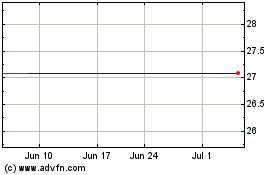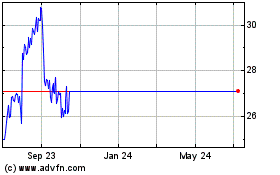By Robert Wall and Asa Fitch
This article is being republished as part of our daily
reproduction of WSJ.com articles that also appeared in the U.S.
print edition of The Wall Street Journal (October 19, 2019).
Mark Hurd, who served as chief executive of three U.S. tech
companies including software-giant Oracle Corp., died Friday.
Mr. Hurd, who was 62 years old, made his name as a strong-willed
leader who helped revive the fortunes of two companies, including
Hewlett Packard, where he was CEO last decade. But some of his
other judgments courted controversy, and he was pushed out of H-P
after a company investigation found misconduct.
A college tennis player at Baylor University, Mr. Hurd cut his
management teeth in the sales and marketing ranks at NCR Corp.,
previously known as National Cash Register Co. He was named
president in 2001 and CEO two years later.
At the time, NCR was struggling, coming off a year when it
posted a loss of $220 million. He quickly moved to expand NCR's
reach and cut costs -- including firing employees, some who had
spent their entire career with the company.
Mr. Hurd said in an interview he had to act quickly. "Being a
CEO is like being a product: If you get out of the gates poorly,
it's hard to recover," he said. "I'm only as popular as my
company's last quarterly results."
He left to lead much larger H-P in 2005 after the company fired
celebrated CEO Carly Fiorina. Four months after he joined H-P, he
reorganized the company and pledged to eliminate about 10% of its
global workforce.
Under Mr. Hurd, H-P overtook Dell as the world's largest maker
of PCs in 2006 by units. That year, H-P also passed International
Business Machines Corp. to become, at the time, the world's largest
technology company by revenue.
But Mr. Hurd was out the door as CEO in 2010 amid claims of
misconduct. The computer maker's board investigated his
relationship with a female contractor. Though the board found Mr.
Hurd didn't violate company's policy regarding sexual-harassment,
it found he violated company standards by submitting inaccurate
expense reports to conceal the relationship.
Mr. Hurd said at the time that there were "instances in which I
did not live up to the standards and principles of trust, respect
and integrity" that he had espoused. A spokesman for Mr. Hurd said
later that there was nothing untoward or improper about Mr. Hurd's
relationship.
He quickly re-emerged at database giant Oracle Corp., hired by
the company's co-founder Larry Ellison as co-president in 2010. The
two were tennis buddies, and Mr. Ellison had lashed out at H-P's
board for pushing out the CEO.
Mr. Ellison, in a note announcing Mr. Hurd's death, called him a
"close and irreplaceable friend."
"Oracle has lost a brilliant and beloved leader who personally
touched the lives of so many of us during his decade at Oracle,"
Mr. Ellison said.
When Mr. Ellison became executive chairman, Mr. Hurd became CEO
in 2014 alongside Safra Catz. His death leaves Ms. Catz as Oracle's
sole CEO.
Mr. Hurd oversaw Oracle's sales efforts at a time businesses
were changing their spending habits and shifting more data storage
to cloud-computing -- a booming field in which Oracle had fallen
behind rivals. Mr. Hurd boosted the sales staff in an effort to
catch up with Amazon.com Inc. and Microsoft Corp., which dominate
market.
Mr. Hurd helped to push Oracle to more aggressively pursue cloud
computing deals by adding data centers, focusing research spending
on the new market and buying companies that could improve its
offering.
Sweeping changes in the way businesses manage their data have
meant Oracle and other legacy information-technology providers have
struggled to maintain their dominant position. Although Oracle's
cloud efforts have gained pace in recent years, the company remains
far behind the two cloud giants. Its market capitalization has
fallen 2.4% since the announcement that Mr. Hurd would become CEO
alongside Ms. Catz. IBM's market cap is down around 38% and
Microsoft's is up around 175% over the same time.
On Sept. 11, Oracle said Mr. Hurd was taking medical leave.
Neither he nor the company disclosed the cause of the illness or
likelihood of a recovery, raising questions about disclosures made
to shareholders.
Changes in his appearance had prompted questions about his
health from analysts and journalists as far back as last autumn. At
the time, an Oracle spokesman said his health was fine and the
company had nothing to disclose about it. Oracle didn't disclose
Mr. Hurd's cause of death and didn't respond to a request for
comment.
Companies such as Oracle that lavishly pay their executives for
their leadership skills should disclose risks to investors, said
Nell Minow of ValueEdge Advisors, a firm that promotes good
governance and shareholder rights. "When you are the CEO (or
co-CEO) of a public company, you relinquish the luxury of privacy
about your medical status," she said in an email.
Mr. Hurd, who was born in New York City in 1957, and married his
wife Paula, who also worked at NCR, in 1990. They have two
daughters.
Write to Robert Wall at robert.wall@wsj.com and Asa Fitch at
asa.fitch@wsj.com
(END) Dow Jones Newswires
October 19, 2019 02:47 ET (06:47 GMT)
Copyright (c) 2019 Dow Jones & Company, Inc.
NCR (NYSE:NCR)
Historical Stock Chart
From Mar 2024 to Apr 2024

NCR (NYSE:NCR)
Historical Stock Chart
From Apr 2023 to Apr 2024
